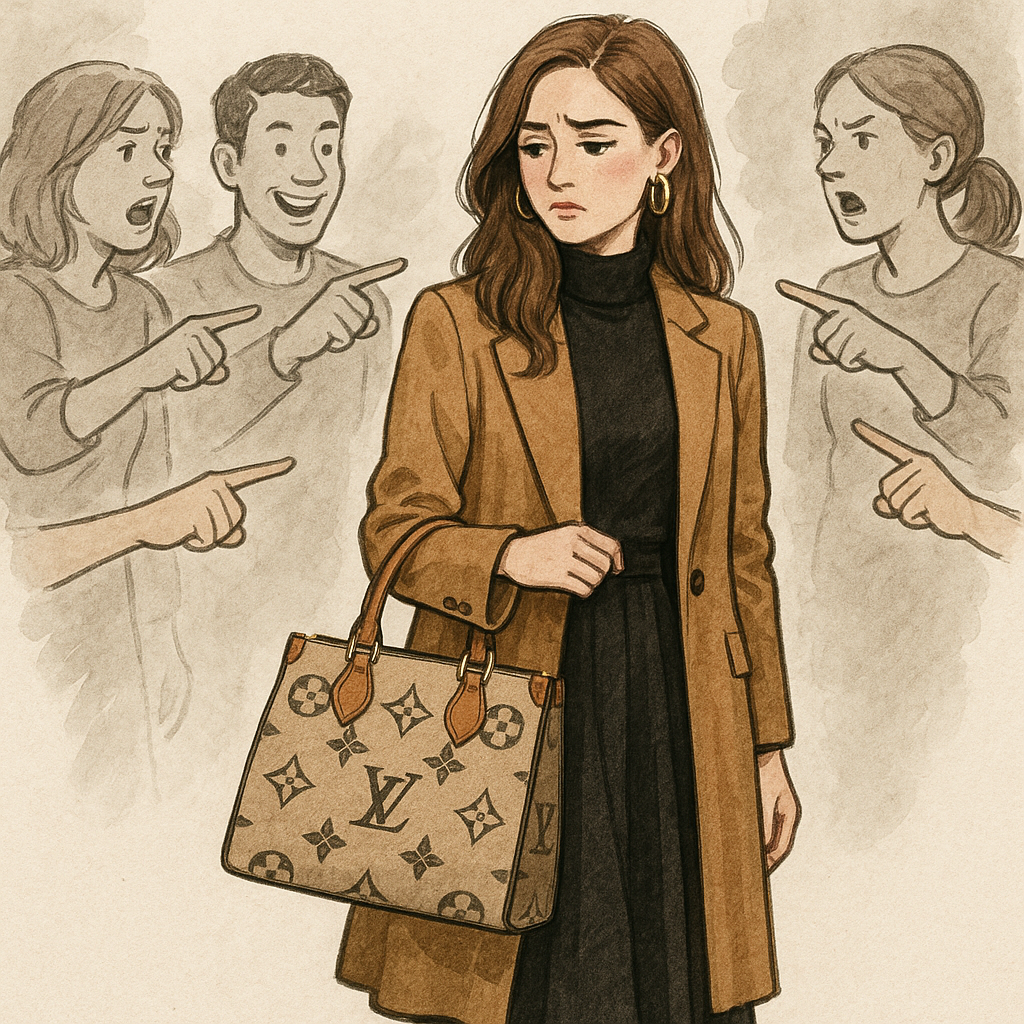I’ve come to realize that every phase of life requires a different set of people, experiences, and even teachers who help us grow and move forward. I remember once finding a particular teacher incredibly inspiring. I admired her, respected her, and felt deeply grateful for everything I learned through her teachings, workshops, and materials. At that point in my journey, her guidance stretched my mind and opened doors I hadn’t seen before.
But after a year or so, I began to notice that her message felt repetitive, the same ideas presented in slightly new packaging. At first, I questioned myself: Why is she repeating the same things again and again? I, who used to rush to secure a seat in both her paid and free offerings, found myself slowly drifting away. Her words no longer carried the same spark, not because she was wrong, but because I had grown. I had absorbed what I needed, and my soul was hungry for the next level.
And that’s the thing, it’s not wrong to move on, just as it’s not wrong to stay. We all need different things at different times. What helps one person in their season of growth may not resonate with someone else, and that’s perfectly okay.
Which is why I find it unfair when people are shamed for their choices. I’ve often seen this happen in self-development spaces, where a coach will say things like, “Your Gucci bag won’t save you. Instead of buying luxury brands, you should be investing in yourself.”
And while I understand the intention behind it, encouraging people to prioritize personal growth, it also feels incomplete. Because why can’t someone desire a Gucci bag (or any luxury brand) and invest in their growth? Why must it always be an either/or?
We all aspire to have different things at different times. For one person, a designer bag may be a symbol of achievement after years of hard work. Perhaps a special gift for achieving a milestone. For another, enrolling in a personal development course may feel like the milestone they need. Both are valid. Both are personal choices. And when we start shaming people for these choices, we’re not really empowering them, we’re projecting our own limitations onto their journey.
Why Do We Shame People for their Choices?
Somewhere along the way, society has trained us to believe that we know better than others. That our definition of “growth,” “healing,” or even “spirituality” is the correct one. So when we see someone engaged in a behavior that doesn’t match our definition of life such as buying luxury items, we dismiss them as shallow. But in truth, we project our own phase of life onto others. If we’ve stopped valuing material possessions, we assume no one else should. If we’ve outgrown a teacher, we assume others should too. What we forget is that not everyone is walking the same path at the same pace.
When someone says, “Your Gucci bag(any luxury item) won’t save you,” the intention may be to inspire, but the delivery often lands as judgment.
What happens is subtle, people start feeling guilty for wanting things that bring them joy or a sense of accomplishment. Instead of reflecting on their growth, they end up questioning whether their desires are “good enough” or “socially acceptable.” Shame rarely leads to lasting transformation. At best, it silences people; at worst, it drives them to hide their choices while still struggling with the same patterns underneath. Growth doesn’t come from being shamed into submission — it comes from awareness, reflection, and the freedom to make empowered decisions.
It is entirely possible to want material things and invest in your personal growth. One doesn’t cancel the other out. In fact, for many people, being able to enjoy the fruits of their labor while continuing to grow inwardly creates a healthier, more balanced life.
As mentioned earlier, when we shame people for their choices, we’re not “helping” them wake up, we’re only invalidating their current stage of growth. That Gucci bag may not “save” them, but maybe right now, it gives them a sense of joy, confidence, or identity that they need. What seems “wrong” or “shallow” to us might be exactly what someone else needs to move forward. By shaming, we only create resistance and division, when what people actually need is space and acceptance to evolve naturally.

stylish woman with a branded bag being shamed by others
Designed with AI
Growth Looks Different for Everyone:
Think of it this way: when a child is learning to walk, we don’t shame them for crawling. Crawling is a phase. Similarly, in adulthood, what looks like a “luxury shopping” phase which may simply be someone’s version of crawling. It’s a step that will eventually lead to walking, running, or even flying.
The point isn’t whether they’re making the “right” choice — the point is that they’re making a choice that fits their current level of awareness. And when they’re ready, they’ll choose differently.
Calling Out vs Normalizing: Where Do We Draw the Line?
Now, let’s address the real debate: If we don’t call out people for their wrong choices, aren’t we just normalizing them? This is a common argument, that society needs to point out harmful behaviors, or else we risk slipping into collective ignorance.
And yes, there’s truth in this. Some choices are genuinely destructive — overspending beyond one’s means, exploiting others, or harming the environment, for example. Ignoring these behaviors entirely can indeed create cycles of harm, both at an individual and societal level.
But here’s where balance is key. Calling out doesn’t have to mean shaming. There is a difference between raising awareness and tearing someone down. When we shame, we make people defensive; when we guide with compassion, we open the door for reflection.
Take the example of a luxury bag. If someone is drowning in debt but keeps buying luxury items, the issue isn’t the bag itself , it’s the deeper emotional need or financial pattern driving that choice. Instead of saying, “Your luxury bag won’t save you,” a more balanced approach could be, “I wonder what this purchase represents for you. Is it a celebration, or is it filling a void?”
This shift turns judgment into curiosity, shame into dialogue, and pressure into choice. And that’s the essence of conscious growth, helping people see the “why” behind their decisions, not forcing them to abandon what brings them joy.
A Better Way Forward
Instead of shaming, we can focus on our own growth. Ask yourself:
- Why does someone else’s choice bother me?
- What does this judgment reveal about me?
- Can I allow others to walk their path while I continue mine?
- If their choice is harming the society, how can I contribute to make things better instead of judging people for their choices?
When we stop shaming others, we free ourselves from unnecessary comparisons and superiority. And more importantly, we give people the dignity to be exactly where they are in their journey.
The Balance Between Outer and Inner Growth
What truly matters is alignment. A designer bag bought from a place of self-celebration feels empowering. The same bag bought from a place of needing validation feels empty. Similarly, investing in self-development from a place of genuine desire feels expansive, while doing it out of fear or comparison can feel just as hollow.
Life is not a competition between the material and the spiritual, it’s about harmony. When both coexist, we begin to live more authentically, free from guilt and free from judgment.
Remember:
- Shame doesn’t transform, it silences. Lasting growth comes from awareness and choice, not guilt.
- Material desires are not inherently bad. The intention behind them matters more than the item itself.
- Calling out ≠ shaming. We can raise awareness with compassion rather than judgment.
- Balance is key. Outer growth (achievements, possessions) and inner growth (self-awareness, healing) can coexist.
- Question the “why.” What does this choice represent for you? Fulfillment, validation, celebration, or avoidance?
Ending Thoughts:
Life unfolds in phases. Teachers, possessions, and even desires come and go as part of those phases. Some will serve us for years, others only for a season. And that’s okay.
So the next time you feel the urge to judge people for their choices, remember: what doesn’t serve you anymore might be exactly what someone else needs right now. And their path is just as valid as yours.
At the end of the day, whether it’s a Gucci bag, a self-development program, or a simple cup of coffee from your favorite café, the real question isn’t “Will this save me?” but rather “What does this mean to me?”
We all make choices that reflect where we are on our journey. Some are practical, some are emotional, some are celebratory. And while it’s important to stay mindful of the patterns that guide our decisions, it’s equally important not to judge ourselves or others for the paths they take.
A luxury bag won’t “save” you, but neither will a workshop, a book, or even a spiritual practice if it’s chosen out of fear or pressure. What will uplift you is the alignment between your inner world and your outer actions — buying, investing, or saying yes to experiences from a place of clarity and self-trust.
So the next time you hear someone say, “That bag won’t save you,” remember: you don’t need saving from your choices. You need understanding of them. Your growth isn’t measured by what you own or what you give up, it’s measured by how consciously you live, how authentically you choose, and how compassionately you allow others to do the same.
Because in the end, the most powerful thing you can own is not a Gucci bag or a self-help course, it’s your freedom to choose, WITHOUT SHAME.
(Author Sana Naseemm is CEO Quanta Mind, a ThetaHealing Instructor, Mindfulness Meditation Teacher, and a Business Mentor)



